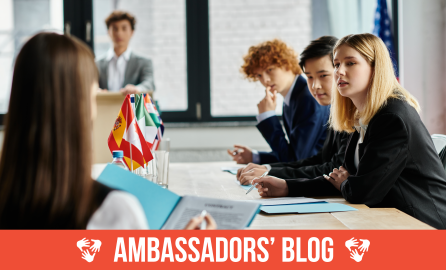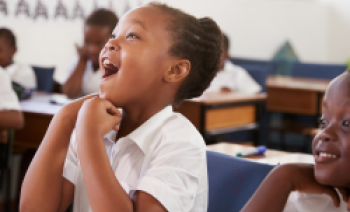On International Day of Education, we recognise the transformative and essential power of education in shaping individuals who will be provided with the tools to tackle the world’s most urgent challenges. Education is more than just acquiring facts and figures - it is about cultivating empathy, critical thinking, and the ability to work together, tolerate and respect each other. These qualities are vital when facing complex global problems, like one of humanity’s biggest questions: how can we resolve conflicts without using violence? Programmes like Model United Nations (MUN) and Model European Union (MEU)1 demonstrate how education can inspire young leaders to develop diplomatic, inventive, and sustainable solutions in an increasingly interconnected world.
Building Skills for Global Governance: The Impact of MUN and Model European Union Initiatives
Model United Nations (MUN) provides a unique environment where students can experience the complexities of international governance firsthand. In this immersive learning experience, participants take on the roles of diplomats and policymakers, debating issues like climate change, migration, and peacebuilding. For example, a delegate might represent a small island nation seeking global funding to counter rising sea levels or act as a mediator between opposing sides in a simulated peace negotiation. These exercises are not purely academic—they mirror the real-life challenges that international cooperation professionals face daily.
-
Diplomacy is not about winning. By participating in MUN, young people learn that successful diplomacy is not about dominating others or “winning” but about finding common ground through discussion and teamwork. This insight directly relates to the question of how to resolve conflicts without resorting to violence. Through MUN, participants learn about the subtleties of decision-making, where compromise and empathy are just as important as strategy and negotiation. It reinforces the idea that education is the first step toward peace because it teaches us to look beyond our own interests and work together for the greater good.
-
From theory to practice. Initiatives like MUN and MEU link education with practical experiences. These programmes often include internships, capacity-building workshops, and policy simulations that let participants engage directly with real-world international cooperation. For instance, some projects and initiatives might challenge young leaders to develop a migration policy that balances humanitarian obligations with national priorities or to propose strategies for rebuilding economies after conflict. By taking part in these programmes, participants not only deepen their understanding of diplomatic theory but also gain the practical skills needed to navigate global systems.
-
Creating opportunities for future generations of policymakers. The effectiveness of these initiatives underscores the importance of creating more opportunities for young people. Many face barriers such as financial constraints or a lack of awareness about these programmes. Institutions should actively expand access by increasing scholarships, covering travel and accommodation costs, and ensuring clear, widespread communication about these opportunities. Projects like these foster cross-cultural cooperation and networking: by bringing together diverse perspectives, they help young people build meaningful connections and develop the skills needed to collaborate on a global scale.
International cooperation professionals play a key role in the success of these programmes. Their expertise and mentorship give participants critical insights into how global governance really works. By sharing best practices, guiding participants, and staying actively involved with initiatives like MUN, these professionals help ensure that tomorrow’s leaders are both well-informed and well-prepared to meet the challenges of international cooperation.
Conclusion
As we celebrate International Day of Education, let us remember that education is far more than a path to knowledge—it is the foundation for action. Programmes like MUN and similar EU initiatives show how education can empower young leaders to handle complex global issues using diplomacy, empathy, and innovation.
A prime example is the B.R.I.D.G.E. Model United Nations, which blends realistic simulations, skills-focused workshops, and mentorship to help participants get ready for real-world international cooperation. Looking ahead, it is crucial to support these programmes and the young people who join them. By making these opportunities more accessible, engaging, and connected to real outcomes, we ensure that future leaders have the skills and vision they need to answer some of the most pressing questions of our time: How can we resolve conflicts without causing further harm? How can we build peace in a world that often feels deeply divided? The answers lie in education, open dialogue, and the conviction that cooperation can prevail over conflict. Let us commit to equipping young leaders with the tools and mindset needed to create a more peaceful and inclusive future.
1. Check the following links to see some of the available EU initiatives:





Log in with your EU Login account to post or comment on the platform.